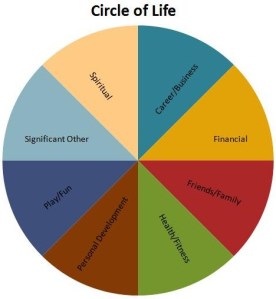 As this year draws to a close, many of us will breathe a collective sigh of relief and whisper (or shout) “Thank goodness that’s over!” Our thought being, of course, that next year will just naturally be better. And in many ways it’s bound to be. But here’s the thing. If you really want YOUR life to be better it requires some planning. It requires thinking about where in your life you were “out of balance” this year and making some specific goals that will help you get back into balance next year.
As this year draws to a close, many of us will breathe a collective sigh of relief and whisper (or shout) “Thank goodness that’s over!” Our thought being, of course, that next year will just naturally be better. And in many ways it’s bound to be. But here’s the thing. If you really want YOUR life to be better it requires some planning. It requires thinking about where in your life you were “out of balance” this year and making some specific goals that will help you get back into balance next year.
Let’s do an exercise. Close your eyes. No wait. Read this first. Then close your eyes. Imagine you are standing in the center of a circle – the circle of your life. There are eight sections in the circle, each representing a different aspect of your life:
- Career/Business
- Financial
- Friends/Family
- Health/Fitness
- Personal Growth
- Play/Fun
- Significant Other
- Spiritual
Now. Think about your life today and where – in that circle – you spend the majority of your time and effort. Is it in your career or business? Probably true for many of us. Is it worrying about your financial situation? Is it at the gym trying to forget about your career and your financial situation? What other aspects of your life are you neglecting in the process? Is your circle leaning significantly in one direction? Time for a change. If you truly want next year to be better you need to get your circle back into balance. Here’s how.
- Assess. Think about each of the eight aspects and how much attention you pay to them. Then rank each of them from 1 to 10 with 1 being “I pretty much neglect it” and 10 being “I spend most of my time and effort here.”
- Review. What patterns do you see? What has been the impact – on you, on the neglected areas?
- Recharge. Change the “out of balance” pattern by creating one or two SMART goals (Specific, Measurable, Achievable, Relevant and Time-bound) in each area of your life. These are not New Year’s resolutions that you’ll have forgotten by January 5, but reasonable goals that will help you pay attention to ALL aspects of your life.
- Commit. Write the goals down. Put a due date on them. Share them with someone who will keep you accountable. Better yet, find an accountability partner who will recharge their circle of life and then you can keep each other accountable. It’ll increase the fun factor, too.
- Maintain. Keep checking your balance throughout the year to ensure that it doesn’t get off kilter. There will be times when you need to focus in one area more than the rest. That’s natural. But assess, review and recharge on a regular basis to ensure that you don’t let that one aspect of your life cause you to sacrifice the others.
Here’s to a balanced and AMAZING 2013!
Till next time,
Karen
Filed under: goals, learning, planning, work-life balance | Tagged: life, life planning, personal development plan, work-life balance | Leave a comment »


